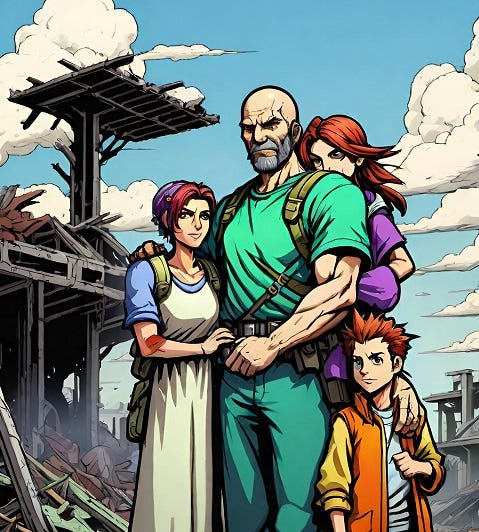One of the books I have been seeking for a while is a family-oriented text to tell somebody how to start modestly preparing without having a crazy immediate commitment to flee the city, go to live in a cave, etc.
I found this a short while ago and I thought it was very close to what I was envisaging. It is 412 pages and presented well with illustrations and layout. All the advice in it is aimed at a beginner level and there is almost no hardcore mad prophet of doom, just really solid guidance on how to turn your household into a robust self-sufficient sanctuary during a crisis.

HAVE YOU EVER IMAGINED how you would manage if tomorrow you woke to find the power out, supermarkets shuttered, and gas stations closed until further notice? Would you be ready to tackle day-to-day activities? Could you feed your family and keep them warm? Are you prepared?
Families dealing with crisis is nothing new. In fact, it has been the norm throughout history. My grandmother fed and clothed her family during the difficult years of the Great Depression. With a young family and a husband serving overseas, my mother coped with rationing during World War II.
In my lifetime, I’ve watched as terrorism became a household word and the Great Recession robbed people I knew of their homes and livelihoods. These days political turmoil is on the rise, the climate is changing faster than most people expected, and global debt threatens financial markets around the world. The U.S. Centers for Disease Control reports that international travel makes a global pandemic a near certainty. Cyberwarfare is our new reality.
One of the downsides to our easy access to news and information is a kind of catastrophe overload. It’s easy to become overwhelmed and demoralized by just how fragile our systems are. Still, there are hopeful signs on the horizon. More communities are organizing resiliency groups and investing in their common spaces. Solar panels dot the landscape in increasing numbers and, after a long period of decline, volunteerism is rising again. Food initiatives like community gardens and community-supported agriculture (CSA) farms are popping up in urban areas as people address the problem of food deserts. Taking family preparedness to a community level bodes well for all of us. Personally, I am grateful that I don’t have to do this alone. Prepared communities are connected communities and prepared families are connected families.
I completely understand the desire to think about something else. Some days I refuse to watch the news. Instead, I drink tea, pull weeds, walk in the woods, or take a nap. But because I have seen the future, my desire to escape doesn’t last long. George W. Bush’s famous words to the FEMA director who was largely believed to have mishandled the aftermath of Hurricane Katrina, “Brownie, you’re doing a heck of a job,” have become a catchphrase for the inability of governmental and private agencies to deal with a crisis of such proportions. It’s my job to prepare now to ensure my family is protected.
PREPPING 101 : 40 STEPS YOU CAN TAKE TO BE PREPARED
(Added to Memex)
Regards, Tex






The Practical Prepper is another good family-oriented prep book. https://poetslife.substack.com/p/the-practical-prepper-a-common-sense